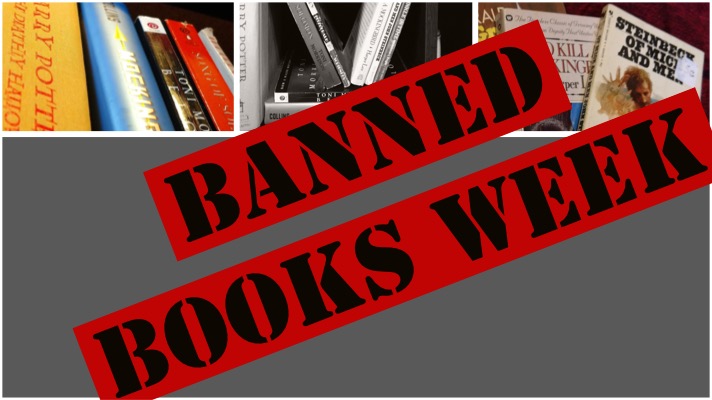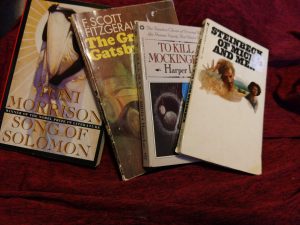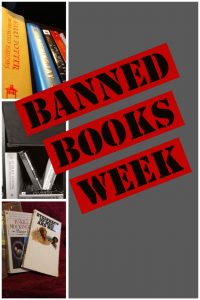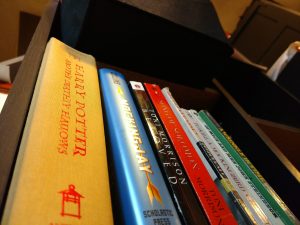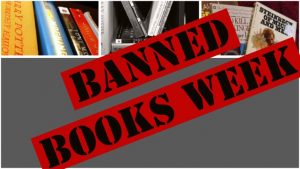Banned Books Week
I don’t often write about reading, school, or literature, but this week is near to my heart. When I was a child I had a book everywhere I went. I had one that I kept in my backpack, for school or for the house. There was one under the seat of my mom’s car, one in the bathroom, and one at my grandparents’ house. It always amazed my mom that I could keep them straight. I never seemed to have a problem because they just took me away to the world where the story happened. It never occurred to me that books could contain anything other than stories from which I could learn. I loved scary stories and horror movies. I felt like I had read everything R.L. Stein had even written. When I was in about fifth grade, I wanted to read a Stephen King book. “It” was one of my favorite movies. We had watched Pet Semetary on tv, so my mom told me I could read the book. I was excited by how many pages the book had. I ended up getting about 60 pages into the book and started coming across words that I knew I wasn’t allowed to say. I tried to return the book to my mother. She asked what was wrong, if I was scared, or if I had finished it already. I told her I didn’t think she wanted me to read it, and I showed her why. I was amazed that she brushed the word off so lightly. I feel like she almost laughed as she handed the book back to me. She told me that since I knew it was a swear word, then I knew better than to repeat it and she wasn’t going to tell me not to read a story I wanted to read because of one word in a few thousand. There are actually closer to five instances of that word in Pet Semetary. I read all of them, and I never repeated them.
When I was in about eighth grade, our high school librarian, Mrs. Palmer, had a display for banned books week. This was the first time that I had heard about banned books week. I assumed they were books that taught you how to do bad things. I wouldn’t have known what it was called at the time, but I expected them to be things like The Anarchist’s Cookbook. I looked at her display and started seeing a lot of books I had read, including some that we had read in school. I had loved reading Tom Sawyer and The Adventures of Huckleberry Finn. As I mentioned before, I had read almost everything R.L. Stein wrote, and the librarian had a stack of his books on the display. I decided to read The Giver that week, because it looked like a good story. It ended up being one of my favorite books. The top 100 most challenged books list became a guide for me of things that I wanted to read. Little eighth grader me decided that if people are trying to control you by limiting your ability to make informed decisions, then it’s your duty to obtain as much knowledge as you possibly could. Here’s a little more about the history of Banned Books Week.
If someone began mentioning authors such as Toni Morrison, Mark Twain, John Steinbeck, and Lois Lowry, you would know that they were talking about a handful of famous authors. You would probably think that they were going to continue on about how these authors and their famous books such as Their Eyes Were Watching God, The Adventures of Huckleberry Finn, Of Mice and Men, The Grapes of Wrath and The Giver helped America to grow and develop. There are people in our country who think that it would be a good idea to remove such books from the shelves of public libraries because they could possibly offend someone, or give children dangerous ideas. The Banned Books List and the list of Challenged Books grow every day, and for several years classic books such as those mentioned above have been toward the top of the list.(Doyle) American libraries are often free to the public, and they stand to supply anyone with academic information about any subject they wish to pursue. Is there a line somewhere in our American doctrine that states when our freedom to acquire knowledge ends? Should there be such a line? American public libraries will forever struggle between those who want to keep their right to read and those who think it is dangerous to have knowledge.
Censorship in the public library system comes in two parts, according to the American Library Association. First, a book is challenged. Somebody, somewhere believes that the material is inappropriate for some reason or another and they ask to have it removed from the library, or sometimes from school curriculum. It is important to note that a challenge only occurs when this person believes that nobody else should be able to access the book. They want it removed, and would probably not mind if it were thrown to the bottom of the ocean so that nobody had to see it ever again. When a book is challenged, there is a decision made on whether to keep the material available or to remove it from the shelves. This decision is made by the PTA, by the library itself, or sometimes by a city council. Occasionally, even a judge gets involved. When a book or other material is removed from circulation or from a school’s curriculum it gains the title of a Banned Book. (ALA)
Censorship, in some form, has been around since the time that books began to be written, and people have been fighting it for just as long. The first recorded burning of books happened in 213BC in China. The government was hoping to regain control of the followers of Confucius. (ALA)
In England in the time of Lord Byron (1788-1824) it was common practice to remove the smutty bits from such classics as the Iliad and the Odyssey or to leave out the relationships between the Greek Gods because the parents did not think that their students could handle reading about such things. (Byron 582) In his poem Don Juan, he mocks his own schooling, which was common for English upper class, in which his scholars removed what most of the boys considered to be the interesting parts. The scholars could not bear to completely remove random pieces of the books they care so much for, so they simply moved the inappropriate parts to one section in the back of the book. This is just one instance of how censorship can harm people more than hurt them. Instead of understanding the instances in which the inappropriateness happened in their classics, the boys read only the parts they were not supposed to read and did not get any of the theory or reasoning behind them. The students were hurt by it in the end, because they were deprived of actually understanding what those classics were about.
Such barbaric activities as book burning are often associated with Nazi Germany, and many other control-oriented groups who came before them. Almost any teenager can tell you from their experience with Indiana Jones and the Last Crusade that the Nazis burned books. What most people do not know is that these actions are still continued today in our own country. In a town outside of Pittsburgh, a city that has one of the best library systems in the country, a group of Christians led by a man by the name of Rev. George Bender burned books and other forms of media because they considered them to be “ungodly.” “In addition to CDs by Bruce Springsteen and Disney videos such as “Pinocchio,” you burned several copies of the “Harry Potter” books.” (Miller)
Many people have never heard of library censorship before. One of the first questions in many peoples’ minds is “Why would anyone want to ban a book?” There are several reasons. In books such as the Alice series, which was the most challenged book of 2003, several sexual references are made. Many parents believe that this series is inappropriate for teenagers, because they like to believe that their children will not engage in sexual activity and they also believe that this book will influence their decisions about their sexual behavior. Several other books are challenged because they address the issue of homosexuality, such as Heather has Two Mommies. People believe that books such as this promote homosexuality and that there is a problem with promoting homosexuality, when in actuality, the authors are attempting to make more of the world comfortable with who they are and who their friends may be. (ALA, Doyle)
The second most popularly challenged book in 2003 was the Harry Potter series by J.K. Rowling. These and other books containing anything to do with magic or fantasy are often challenged because Christian Americans believe that the books are corrupting their children’s moral values and are turning their children Wiccan, which many parents view as a bad thing. Religion is one of the biggest reasons why people challenge books. There are many times that Christian views or American ideals are very evident when books are banned or challenged. It is rare that a Christian book is challenged for teaching Christian values, but there is a laundry list of books that are challenged because they promote Wiccan, Buddhism, and Judaism. Several others such as Mein Kampf, Communist Manifesto, and Fahrenheit 451 have been challenged due to their controversial political views.
The book Draw 50 Monsters, Creeps, Superheroes, Demons, Dragons, Nerds, Dirts, Ghouls, Giants, Vampires, Zombies and Other Curiosa was challenged in 2001 because one “parent…said the book is satanic” because it mentioned such creatures as vampires and zombies. (Doyle) I am genuinely confused, though, as to how Harry Potter promotes Wicca especially when the main characters all celebrate Easter and Christmas. Alice’s Adventures in Wonderland was challenged for a very similar reason. The librarian believed that “Animals should not use human language, and that it was disastrous to put animals and human beings on the same level.” (Doyle) People are afraid of anything that is out of the ordinary, and fantasy books are often among the challenged.
Other books are banned or challenged because they are inappropriate for their age level. Several books including How Babies are Made and Mommy Laid an Egg were both moved from the children’s sections of the library to the adult sections because they describe sex. Joy of Sex was banned completely in Ireland. (Doyle)
In 2018, the American Library Association now has separate versions of the top 100 banned books. The top 100 from 1990-1999 can be found here. The top 100 from 2000-2009 can be found here.
When I first began learning about the banned books list, the American government felt as though they had been trying to infringe our rights to read whatever we chose. The first amendment states that “Congress shall make no law respecting an establishment of religion, or prohibiting the free exercise thereof; or abridging the freedom of speech, or the press on the right of the people peaceably to assemble, and to petition the Government for a redress of grievances.(Doyle)” The USA PATRIOT ACT, also known as the “Uniting and Strengthening America Act by Providing Appropriate Tools Required to Intercept and Obstruct Terrorism Act of 2001” (McCulland), infringes upon these rights. By masking their actions with the name of national security, our government has launched a war upon its own people which is far worse than the war McCarthy waged against the ‘communists’ in the United States less than fifty years ago, yet many people do not seem to remember these incidents throughout history where the government stepped over its bounds and took away the rights of the people it is supposed to be protecting. Under the PATRIOT Act’s very vague specifications, the FBI is allowed to demand records of any public library patron at any time without a search warrant. They can then draw conclusions about this person simply from their library record. This, I believe, is a great disservice to any in our country who pursue knowledge. Dwight D. Eisenhower once said,
“Don’t think you’re going to conceal faults by concealing evidence that they ever existed. Don’t be afraid to go in your library and read every book, as long as any document does not offend our own ideas of decency. That should be the only censorship.
How will we defeat communism unless we know what it is, what it teaches, and why does it have such an appeal for men, why are so many people swearing allegiance to it? It’s almost a religion, albeit one of the nether regions.
And we have got to fight it with something better, not try to conceal the thinking of our own people. They are part of America. And even if they think ideas that are contrary to ours, their right to say them, their right to record them, and their right to have them at places where they’re accessible to others is unquestioned, or it’s not America.”
—Dwight David Eisenhower (ALA)
Under the PATRIOT Act’s Section 215(Hoover), our government has the laws in place to begin banning our right to knowledge, and our right to read. It is a tactic used by dictators to frighten people into blindly following wherever our government takes us without question. In the aftermath of 9/11, if one does question the White House, that person is accused of being un-American. This law could make people afraid to go to public libraries to gain information and knowledge. Our forefathers fought and died for the belief that Americans should be free, whether they are free to make their own mistakes or free to make their way in the world. America should be educated in all topics, for as Eisenhower said, how are we to ever defeat our enemy if we do not know who he is?
In my opinion, no sort of fiction should be unavailable whenever someone wants to view it. Books were written to educate others so that they do not make the same mistakes the authors or the characters made. They are written to show people the mistakes that have been made in the past, with the hopes that they will not be repeated in the future. By banning books, people are dooming society to repeat the same course of events over and over again. Therefore, it is a crime against society to keep information from the public or to frighten them into thinking twice before reading a book. In the novel Fahrenheit 451, books are completely illegal. Crime runs rampant, and there is no regard for the lives of other human beings. Firemen go to houses of people they suspect of owning books and burn down their houses. Every source of information is monitored by the government, which chooses what information to put on the air and what information should be hidden away. This book is on the banned books list, and it is frightening because the novel seems like it is a possibility of things to come.
The American Library Association has taken a stand against the banning or censorship of books. As a celebration of the authors and titles frequently challenged, they have set up Banned Books Week, which takes place annually in September. It is celebrated by encouraging readers to go out and read something that is controversial. It does not matter what the reader thinks about the book, but more that the book made them think in the first place. Those are the books that make it onto the banned books list in the first place. Some places, such as the Carnegie libraries in Pittsburgh, set up discussion groups and readings to encourage banned books (Hoover). Banned books week is an important part of the fight against censorship in public libraries. If you would like more information about banned books or banned books week, please contact the ALA or the American Booksellers Association.
Books are banned and challenged for every reason imaginable. There will never be anything that is worth the paper it is written on if it does not inspire somebody to take action. Even if the action manifests as hatred toward the book itself, at least the author did their job and made the audience think. It is a personal goal of mine to make it onto the Banned Books List, because then I know that I have made a difference in the way people perceive the world. Please, if you have some spare time on your hands, go out and read a banned book. Whether you love it or you hate it, have emotion and act on it. Just keep one thing in mind; if a book moves you so much, should not other people be free to view your life changing experience as well? It is just a thought, but hey, what do I know, I’m only half way through the list.
Works Cited
American Library Association. 11 Nov. 2004. American Library Association. 11 Nov. 2004. <www.ala.org>.
Banned books… resource book. Chicago, IL: American Library Association, 2000
Barnes, George. “Every Book’s Objectionable to Somebody.” Telegram and Gazette. 5 Oct. 2004: B3
Byron, Lord. Don Juan.
Chang, Nancy. The USA PATRIOT Act. Nov. 2001. Center for Constitutional Rights. 11 Nov. 2004. <http://www.ccr-ny.org/v2/reports/report.asp?ObjID=BdSKj6pXDC&Content=159>.
Foerstel, Herbert N. Banned in the USA.: a reference guide to book censorship in schools and public libraries. Westport, Conn.: Greenwood Press, 2002
Karolides, Nicholas J. 100 Banned Books. New York: Checkmark Books, 1999
Knuth, Rebecca. Libricide. Westport, Conn: Praeger, 2003.
Library (institution),” Microsoft Encarta Online Encyclopedia 2004
http://encarta.msn.com © 1997-2004 Microsoft Corporation. All Rights Reserved.
McCullagh, Declan “politechbot.com” <http://www.politechbot.com/docs/usa.act.final.102401.html>
Miller, Michael. “Harry Potter Meets Wizard of Dumb.” 23 April 2001 South Florida Business Journal. 17 Nov. 2004 <http://southflorida/bizjournals.com/southflorida/stories/2001/04/23/editorial2.html
Noble, William. Book banning in America: Who banns books?…and why?. Middlebury, Vt.: P.S. Eriksson, c1990
Pike, George. “A SAFEr USA PATRIOT Act?” Information Today. Vol: 21 (2004) 17
Hoover, Bob. “Support a Banned Book– Read it.” Pittsburgh Post Gazette. 2 Oct. 2004: B4
Steffen, Susan. “A library balancing act.” College & Research Libraries News. Vol: 65 (2004) 433.

